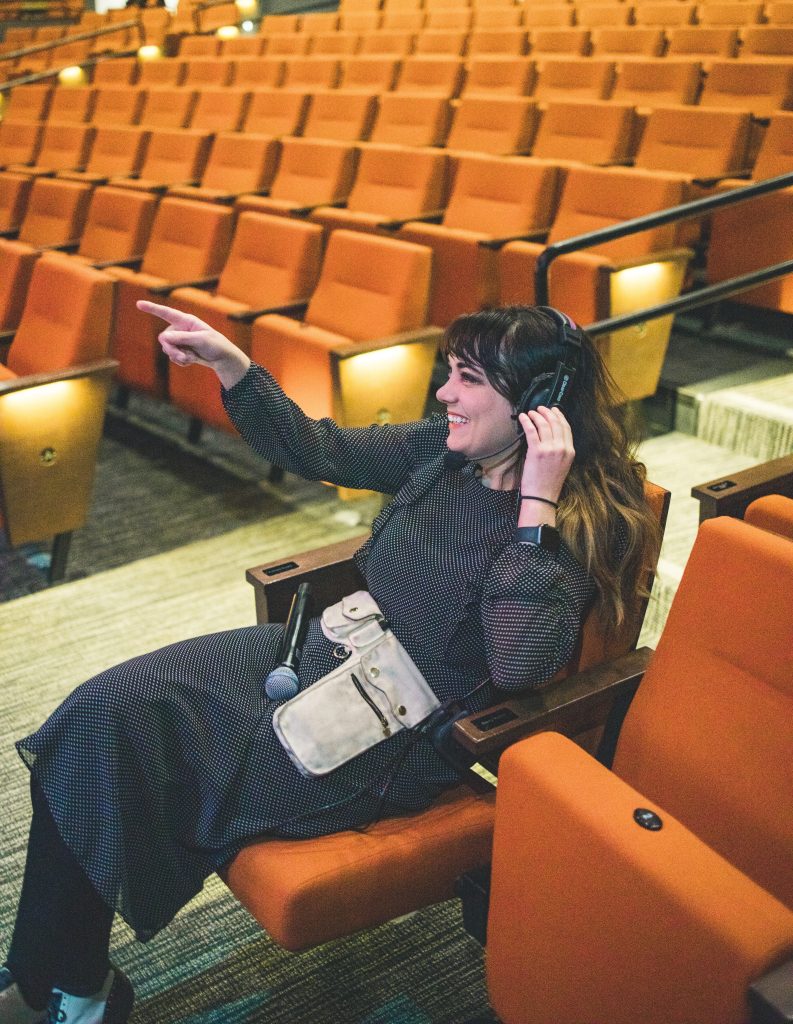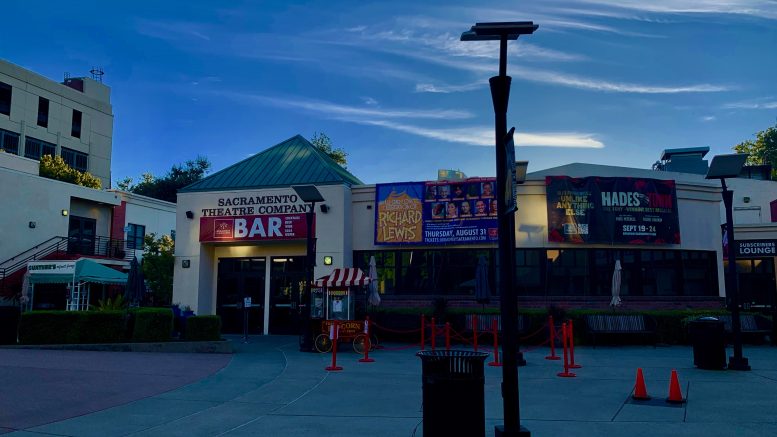Several are struggling, though Sacramento Theatre Company is reportedly in the murkiest of waters
By Patti Roberts
The news that iconic theaters across the country are closing has recently sent shockwaves through the American arts community. Mark Taper Forum, a groundbreaking Los Angeles theater since 1967, announced in June that it was pausing its productions, joining other regional theaters around the nation who are ceasing or postponing productions, laying off staff and cutting production costs.
Many theaters have seen a decline in attendance after the COVID shutdowns and haven’t solved the problem of bringing audiences back to live productions. They are also facing the challenges of aging theater patrons, a lack of regular local media coverage and having to compete against myriad streaming platforms.
The latest survey by the National Endowment for the Arts and Census, conducted in 2022, found that 10.3% of American adults attended a musical last year, down from 16.5% in 2017; only 4.5% attended a play, down from 9.4%.
And here in Sacramento, a heartbreaking reality is setting in as one of the city’s beloved and the longest-running theater companies is reportedly facing an uncertain future. The Sacramento Theatre Company, STC, which officially opened in 1945 and has provided continuous productions over the years, could see its stage go dark in the near future, according to individuals familiar with the situation.
Two months ago, the majority of STCs staff was reportedly let go, Executive Director Michael Laun resigned as of June 30, as did a number of STC board members. And there are no announcements of an upcoming season, which usually starts in September — their website page simply states “no events,” although STC may be continuing its schools programs and special events. Also, there appears to be no current search for a new executive director to replace Laun while Board President Betsy Wood is listed as “Interim Executive Director.” (STC did not reply directly to a request for comment about Laun’s replacement.)
According to sources in the theater community who spoke on background, the STC ended its last season in debt and there is an interest in Broadway Sacramento absorbing the H Street stage facilities. However, STC is still holding summer theater camps and may be continuing its school programs. But many local theater experts believe STC could be facing its final curtain call soon.

After a number of requests were sent to STC for a statement or further information, STC has declined to comment, replying in an email that “our interim Executive Director has chosen not to respond at this time.” And Broadway Sacramento has chosen not to comment regarding the possible takeover of STC theater buildings.
While STC is facing a questionable future, two other main theater companies in town — B Street Theatre and CapStage — survived COVID lockdowns and are seeing some return of audiences. However, though they are currently steady on their feet, they also see challenges ahead for regional theaters.
First, they’re facing the economic fallout of COVID disruptions and the end of government assistance that kept them afloat at the height of the pandemic. Second, they are actively working to woo back their regular subscribers and patrons. And third, they are aware of the need to outreach to more diverse theatergoers.
“We had to shut down production from March 2020 until August 2021, which of course led to the layoffs of much of our staff,” said CapStage Managing Director Keith Riedell. “And many actors, technicians and theater artists left the field during the closures. But the shutdown gave us time to think about the company we wanted to be when we opened back up.”
For B Street, the closing of in-person productions “resulted in layoffs, canceled artist contracts and what was essentially an elimination of all earned revenue,” said B Street Artistic Director Lyndsay Burch. “Staff and artists who were laid off during the 18-month closure had to find other work and this made reopening very difficult. Many people moved on to other industries or retired during the pandemic. And then of course there was the increased cost of goods as well as supply chain issues that added to the expense of building sets, costumes, and props.”
Both theaters received Paycheck Protection Program and other grants to help them through the closures.
“Pandemic aid allowed us to pay our bills and keep the company a going concern,” Riedell acknowledged. “However, it did much more than that: It allowed us to build substantial operating reserves that we’ve been able to maintain.”
“I think most theaters spent their relief funds within 6-9 months of reopening and now, with no funding on the horizon, many theaters are having to make drastic changes to stay afloat,” noted Burch.

Both theaters used the downtime to restructure and look at long-term goals. After 35 years, B Street founder and Artistic Director Buck Busfield retired, and Burch took over the helm. And CapStage promoted Riedell as managing director to work alongside Artistic Director Michael Stevenson.
“The company needed a comprehensive strategic plan to look forward into the next five years, which we’ve implemented as a way to focus on developing a growth trajectory for the organization,” said Riedell. “We also have spent a great deal of time looking at diversity, equity and inclusion and how we incorporate that into everything we do.”
Celebration Arts, Sacramento’s Black Theatre non-profit, also finds itself in dangerous waters after COVID.
This week, the 37-year-old company founded by James Wheatley announced it was cancelling an entire three-week production of MacBeth Project’s MOTHER JULIET & HER ROMEO due to Covid, which hit several key cast and crew members. “We were already struggling to make ends meet before, and now canceling this run will set us back further,” said Artistic Director James Ellison. “We are being creative by offering new types of programming, including comedy shows, concerts, and a staged reading, until our next theatrical productions of THURGOOD and A RAISIN IN THE SUN this fall/winter, and we hope to attract more patrons to the theater.”
Unfortunately, selling more tickets is not the solution. Ticket sales alone do not cover Celebration Arts’ operating expenses, and fundraising also presents a challenge. Many long-time donors have left the area or passed away. “We rely on donations from the community and our patrons,” Ellison said. “We are experiencing ‘donor fatigue’ that many other arts organizations are facing. So we are focusing on giving days like Big Day of Giving, sponsored by the Sacramento Region Community Foundation, and gearing up for Give 8/28, sponsored nationally by the Young, Black & Giving Back Foundation.”
Celebration Arts depends on volunteers, donations, and grants to keep our doors open.
“We exist to provide training and performance opportunities highlighting the Black experience and have been struggling since the pandemic to fill seats for our exceptional productions,” Ellison explained. “This season has featured some of Sacramento’s top theatre actors and directors, including Anthony D’Juan, Imani Mitchell, and Nicole Limón.” “We are hopeful that Celebration Arts will continue upward momentum as we strengthen our community partnership with St. Hope and gain local sponsors like SMUD and Kaiser Permanente leading into our 2024 `Black Girl Magic’ theatre season,” said Ellison. More details and tickets are available at celebrationarts.net
Riedell cites some of the challenges ahead include an aging theater population, people using in-home entertainment platforms who aren’t going out to theater anymore, and the rise in inflation and general living costs that keeps folks from spending on entertainment.
“Our audiences are enthusiastic, supportive, engaged, and getting younger and more diverse, though still dominantly older, a majority being 65 years and above,” he said. “However, I think we sell our older audiences short. For the most part, our older patrons are on the ride we take them on each season, and embrace the socially conscious, conversation-generating theater we produce.”
While CapStage is trying to rope in a younger audience, Riedell acknowledges that “they have a larger menu of social options to choose from and we may not be high on their list.”
B street is also looking at the overall decline in theater audiences.
“I really think about this a lot and believe there are so many factors,” said Burch. “As most people know, adult theater audiences have been slowly declining for quite some time. Theater was sustained by a generation who saw their support of the arts almost like a civic duty. Well, now that base has dwindled for many reasons.”
“So, the question becomes how do theater’s pivot in this moment?” Burch added. “I’m confident audiences will continue to rebound, which we’ve already started to see, but unfortunately it’s not going to be quick enough to pay for the increased costs of labor and goods that it takes to produce theater.”
One aspect Burch sees as a plus is offering a variety of options, with the acknowledgement that in a season, “audiences may not like every single choice, but they appreciate a range of topics. I believe theater is supposed to shine a light on the universal and the things that bring us together.”
Riedell is also hopeful.
“We see a great future for Capital Stage as we develop more collaborations within the community, and throughout the theater industry nationally,” he said. “Our 20th anniversary season next year will be a time to celebrate our success and look forward to a future where we can tell relevant stories that explore the human experience and represent the diversity of our great community.”
Steve Maganini contributed to this story.
This story is part of the Solving Sacramento journalism collaborative. Solving Sacramento is supported by funding from the James Irvine Foundation and Solutions Journalism Network. Our partners include California Groundbreakers, Capital Public Radio, Outword, Russian America Media, Sacramento Business Journal, Sacramento News & Review, Sacramento Observer and Univision 19.



I use entertainment as an escape. Provide me with happy and interesting plays and I will attend. If the play is too progressive or preachy I will not watch.
I wish B Street nothing but success. I will make a better effort to attend a play before October.
The perceived lawlessness is cities (though way overblown) also keeps suburbanites away.